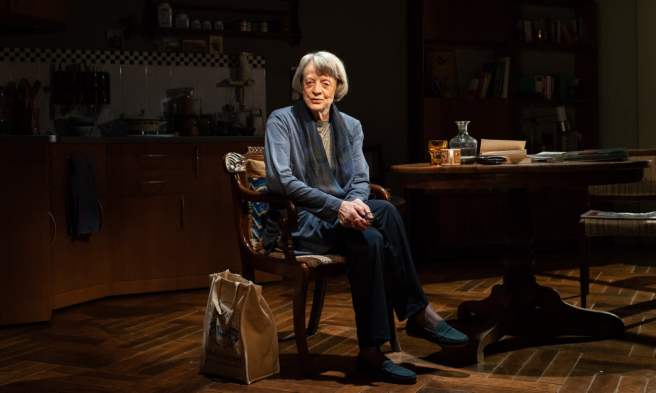
A German Life, at The Bridge Theatre, London
This is, of course, ‘the Maggie Smith play’ in which the Dame of the realm returns to live theatre after a twelve year break, at the age of 84. She plays Brunhilde Pomsel, an ordinary, largely apolitical, Berlinner, who became Joseph Goebbels’ secretary during the Second World War. The play is adapted by Christopher Hampton from interviews that Pomsel gave to documentary film-makers during her final years (Pomsel died in 2017, aged 106).
In all the hoo-ha around the Dame’s return, the play’s subject matter has sometimes got a bit lost, but it feels scarily appropriate that this story is being told now. Pomsel’s journey from working for a Jewish business, and having Jewish friends, to becoming a secretary in Joseph Goebbels’ propaganda ministry, without even being a true Nazi believer, mirrors the way in which Germany gradually succumbed to the Nazis. Facism, it seems, arrives not with a bang but with a whimper. There is uneasy laughter from the audience when Pomsel says that people now “wouldn’t fall for the hot air like we did”.
Smith’s performance as Pomsel is – as you’d probably expect – a wonderful thing. It’s a very subtle, nuanced performance, which brings out the humour of Pomsel’s situation, as well as the horrors. There is no grandstanding, no big gestures, nothing over the top – indeed she never moves from her seat – but she holds the entire packed theatre’s attention completely, for the entire play (just under two hours, no interval). No mean feat of stamina for an actor at any age, let alone at 84.
The production is equally subtle, and equally brilliant. We never leaves Pommel’s room, with the outside only intruding through occasional sound clips, such as part of Goebbels’ ‘total war’ speech, which still chills. There is also a clever trick with the stage: The Bridge for this production is configured with a thrust stage, but at the beginning of the show the set is laid out as if for a proscenium arch stage, with a large empty space in front. The floor of Pomsel’s apartment gradually slides forward into this space, but at such a slow speed that even when you know what’s happening you can’t actually see it move. This could just be a clever trick, a way of bringing Pomsel towards the audience as we are sucked into her story, or it could be read as a metaphor for the insidious way Nazism infiltrated itself into German life.
A German Life is at The Bridge Theatre until 11th May: https://bridgetheatre.co.uk/whats-on/a-german-life/